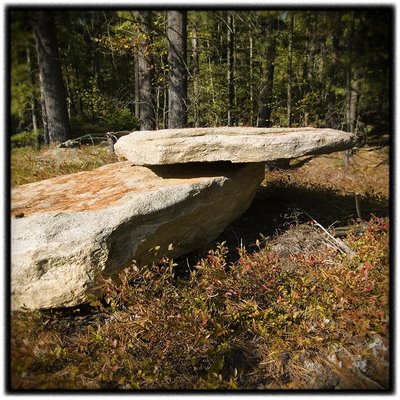ku # 407

Ana asked, "in your previous post you mentioned 'photographers use this defining visual characteristic of the medium (i.e. the camera is capable of faithfully recording the object of its gaze) to create untruths.' I'm not sure what you were getting at. What are the untruths you were thinking about when you made that statement?"
Well, as Paul Simon crooned,
"Kodachrome, they give us those nice bright colours
They give us the greens of summers
Makes you think all the worlds a sunny day, oh yeah
I got a nikon camera, I love to take a photograph
So mama dont take my kodachrome away"
Other examples - political propaganda, Playboy centerfolds, Velvia landscapes, absolutely flawless automobiles/women wearing makeup, amongst many more...i would also venture to write that these apparently-true-but-untrue denoted(s) create untrue connoted(s) as well. Photographers deliberately distort the camera's gaze to create the unassumed-to-be-"real" as a kind of set up (for the uncritical/undiscerning/naive) with the intent of serving a connoted untruth...



4 Comments:
Tena koe ehoa
If you refer to the basis of alteration has an untrue moment of representation then I totally agree. However the basis by which people assume to interpret an image whether altered or not is solely their discetion to do so.
I'm not one to falsify the moment, at least not purposely. Okay thats BS I have and will alter my images to convey the expression of the moment I want to achieve.
What is more pertinent is what you allude to I think in terms of a general acceptance of "what defines the term photography".
I have viewed many sites and many portraits and at some lenght of discussion, have wondered why on earth the generalised conception of portraiture photography is, "to display beauty where previously none may have existed?"
The truth of an image or the beauty of it will always come from the truth of the photographic expression. How each photographer expresses an image is often delivered by a preconceived notion of what is and what isn't photographically acceptable.
Any hoodle....Where photography fails to continue being truth is at the point where human intervention begins. The fact remains that the world is conceited and marvels at the ways in which to aesthetcially and physically beautify itself. This same unconscious concept is attached to photography, centrefolds, Velvidia landscapes and flawless automoblies.
P.S I don't reckon Paul Simon crooned either, more like a skittle!
The flaw I find in your argument is the implied idea that the "camera's gaze" is capable of producing "truth" as long as the tampering of humanity is left out of the equation - something which is obviously impossible. Surely the camera reproduces the scene we allow before it with startling clarity. Yet, despite this, the resulting image virtually never reflects "reality" in a truly accurate sense. Speaking only of nature photography, I do agree that certain photographs are more "true" in the sense that their end products more accurately resemble their real world starting point. I'm strictly speaking of the corresponding formal values here, not the "truth" of perception (another tangent to this issue). Things can get rather "fuzzy" in a hurry.
One could argue that vignetted and blurred corners are untruthful as well. The intention may be different in one sense, but it seems to be just another way to get people to "see" what we desire them to "see". :)
Do you consider yourself to be a photographer of "truths"? I'm looking forward to seeing how this topic develops and evolves.
an image is only an image taken by a camera. it does not lie, its the photographer, or the viewer that assumes that the photograph is a truthfull representation of what was before the lens.
hey anonymous # 1
I do consider myself to be a photographer of "truths" - at the very least, of visual truths of the denoted kind...
Post a Comment
<< Home